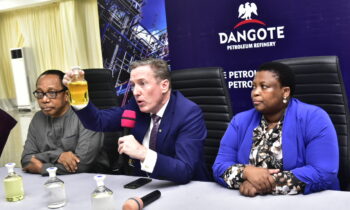As Nigeria is busy begging international investors across the globe to come and invest in its oil and gas industry, her counterpart in OPEC, the United Arab Emirates has announced plans to invest up to $54 billion over the next seven years to meet its growing energy demands and triple its supply of renewable energy.
Nigeria is grossly lagging behind in both investments in oil and gas as well as renewable despite being blessed with huge resources which it can use to develop these energy sources and boost its economy.
Bad leadership and gross incompetence of the people at the helm of affairs have been the bane of Nigeria’s energy problems
UAE and Saudi Arabia are the two GCC members leading in renewable energy investments and rapidly diversifying their energy portfolios in the Gulf region.
Last year, the Emirates Nuclear Energy Corporation (ENEC) announced the commissioning of the country’s first-ever nuclear power plant-the Barakah unit 1.
The 1,400-megawatt nuclear plant is the single largest electricity generator in the UAE since reaching 100% power in early December, and is now providing “constant, reliable and sustainable electricity around the clock.”ENEC says Barakah unit 1 is “now leading the largest decarbonization effort of any industry in the UAE to date.“
House Republicans Propose The
Following in the footsteps of Saudi Arabia, the UAE is laying a strong foundation for the energy transition.
Masdar, the clean energy arm of Abu Dhabi sovereign wealth fund Mubadala, is building renewable capacity in central Asia after signing a deal in April 2021 to develop a solar project in Azerbaijan.
Since its inception in 2006, Masdar has built a portfolio of renewable energy assets in 30 different countries, having invested about $20bn to develop 11GW of solar, wind, and waste-to-energy power generation capacity.
And now Masdar says it intends to apply the lessons gleaned abroad to develop clean energy capacity back at home.
“Solutions we have developed in our international operations will definitely have applications here in the UAE“, says Masdar’s El-Ramahi.
For instance, Masdar plans to bolster the UAE’s comparatively weak wind resources by developing domestic wind farms using the latest class three turbines that are able to harness electricity even from low wind speeds.
Further, the company is also constructing a $1.1bn facility that will burn garbage to generate power in one of the world’s largest waste-to-energy plants. Once complete, the plants will incinerate almost two-thirds of the household waste the country generates every year.




